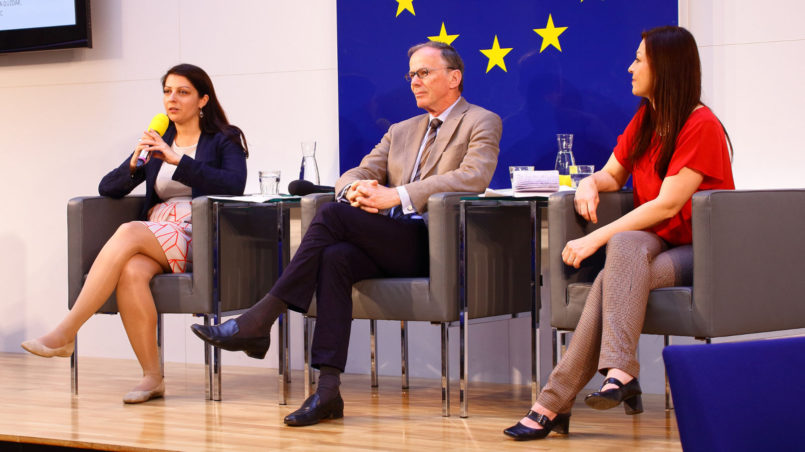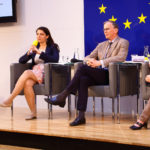How Threatened is the Freedom of the Press in Europe?

In the context of the “Primavera Festival for Human Rights”, a panel discussion on the topic of the freedom of the press took place on 4 May 2018 on the occasion of the International Press Freedom Day. Under the title, “Freedom of the Press and Freedom of Expression in Europe – Quo vadis?”, current threats to freedom of the press and freedom of expression, especially in Europe, were discussed.
The SPÖ (Austrian Socialist Party) politician and former ORF (Austrian national public service broadcaster) journalist, Eugen Freund, who also acted as a moderator, emphasised in his introduction that “freedom of the press is an essential part of human rights”. Journalists sometimes expose themselves to considerable dangers, either directly as war reporters or because they are “in the way of the powerful”. Examples of the latter could also be found in Europe, such as the murders of Daphne Caruana Galizia in Malta in October 2017 or of Jan Kuciak in Slovakia in February 2018. Further dangers for the freedom of the press are controlled communication, as it is also exercised by the current Austrian government, the attacks especially from the ranks of the FPÖ (Freedom Party of Austria) against ORF, but also tendentious reporting by the media, such as on the subject of crime.
In her opening statement, lawyer and politician, Muna Duzdar, mentioned the campaign against hate speech of the Council of Europe1. “Journalists have the impression that they are very often personally attacked in public opinion,” says Duzdar. “Journalists are not being imprisoned here; instead, their credibility is being discredited through accusations of fake news. That’s a soothing development.” Freedom of the press and freedom of expression are thus increasingly restricted and must also be defended here “by all means”. ORF must also be protected so that there are not only private media sometime: “The targeted attacks on ORF are a foretaste of what we can expect,” according to Duzdar, who described the discrediting and political re-colouring attempts as an “attack on the freedom of the press”.
Polish-born Green politician, Ewa Dziedzic, pointed out that authoritarian regimes such as those in Egypt have long been known for imprisoning journalists. But there is also the less drastic “controlled freedom of the press” that is now common in some Eastern European countries, for example in Hungary and Poland. “But I would like to put this a little into perspective,” says Dziedzic, “because there has never been real freedom of the press in these countries. After 1989, we all hoped that this would improve, but the authoritarian conditions quickly returned.” In Hungary and Poland, the current governing parties had long been preparing to take power, among others by exerting influence on the press. In these countries, critical media have also been starved economically by the government’s refusal to place advertisements. In such cases, however, social media has helped to preserve the freedom of the press because it enables direct communication. “Incidentally, it is not the case that right-wing parties openly reject freedom of the press,” according to Dziedzic; in fact, many right-wing governments expressly refer to freedom of the press. “Only they mean different media and call different threats than we do.”
Eugen Freund stressed that it was the task of the EU Member States to create a safe environment for journalists:
I find it almost a bit sad that we have to record this, because it is no longer self-evident. Things are also happening in EU countries that we cannot approve of.
He recalled an incident that had occurred in connection with his candidacy for the 2014 European elections: the Kronen Zeitung (Austria’s largest newspaper) accused him of having been active as a spy for Yugoslavia in 1978. “All the media repeated this. The fact that all this was a pack of lies was later reported in a three-liner.” In this case, the media in Austria had not been synchronised – “they had synchronised themselves”.
Ewa Dziedzic pointed out another problem: journalists take over government press releases without much research because they simply no longer have time to do so. “No one really cares how much freedom of the press is threatened here.”
Muna Duzdar recalled the power of social media companies such as Facebook, whose algorithms determine what people read. “That’s actually totally undemocratic.” Regarding the recent changes to the Facebook algorithm, she reported:
We can see right now that social media can also impose restrictions very quickly. Facebook, therefore, has a lot of power and can use it to give preference to those who can pay.
Ewa Dziedzic also pointed out the economic problems: “Traditional print media also finance themselves through advertisements and orient their work accordingly.” Today how much space a party gets in a medium often depends on the advertising budget. On the other hand, everyone can express their own opinion about social media without having a budget.
Freund reported that newspapers used to have high credibility “because everything in the papers was believed”. Conspiracy theories also become more credible if they are printed.
In the US, the formation of opinion bubbles is much stronger than here, because some only consume Fox News and others only CNN, and these groups simply no longer talk to each other.
Duzdar noted that the targeted distribution of fake news has always existed. “But now we have the new phenomenon that is specifically organized by parties, and that is extremely dangerous.” The speed with which fake news is distributed is also very dangerous, a later correction would then hardly be possible. “Whole states have discovered this as a new political weapon.” The social networks favour right-wing parties more than left-wing parties because they are “rage machines”: the networks encourage negative emotions and are, therefore, particularly suitable for abuse by right-wing parties. “This is something that can massively endanger democracy!”
Overall, this discussion, which referred exclusively to Europe, identified a whole range of possible threats to freedom of the press: from the murder of inconvenient journalists to more subtle dangers such as the impairment of credibility and the control of the flow of information by the algorithms of social media groups.
Translation German-English: Anna Dichen
_
1 http://www.europewatchdog.info/en/instruments/campaigns/no-hate-speech/
Credits
| Image | Title | Author | License |
|---|---|---|---|
 |
00_VA_Wie bedroht ist die Pressefreiheit in Europa?- | Martin Krake | CC BY-SA 4.0 |
